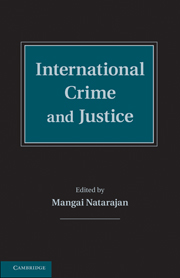Book contents
- Frontmatter
- Contents
- List of Figures
- List of Tables
- List of Contributors
- Foreword
- Preface
- Introduction
- Part I International Criminology
- Part II Law, Punishment, and Crime Control Philosophies of the World
- Part III Transnational Crime
- Part IV Organized Crime and Terrorism
- Part V International crime
- Part VI Delivering International Justice
- 44 The Role of the United Nations
- 45 Treaties and International Law
- 46 International Criminal Tribunals and Hybrid Courts
- 47 The International Criminal Court
- 48 The ICC and the Darfur Investigation
- 49 Victims’ Rights in the International Criminal Court (ICC)
- 50 Nongovernmental Organizations and International Criminal Justice
- 51 Global and Regional Human Rights Commissions
- 52 The Truth and Reconciliation Commission in South Africa
- 53 The Guatemalan Truth Commission
- Part VII International Cooperation and Criminal Justice
- Part VIII International Research and Crime Statistics
- Part IX International research resources
- World Map
- Index
- References
52 - The Truth and Reconciliation Commission in South Africa
Published online by Cambridge University Press: 05 October 2014
- Frontmatter
- Contents
- List of Figures
- List of Tables
- List of Contributors
- Foreword
- Preface
- Introduction
- Part I International Criminology
- Part II Law, Punishment, and Crime Control Philosophies of the World
- Part III Transnational Crime
- Part IV Organized Crime and Terrorism
- Part V International crime
- Part VI Delivering International Justice
- 44 The Role of the United Nations
- 45 Treaties and International Law
- 46 International Criminal Tribunals and Hybrid Courts
- 47 The International Criminal Court
- 48 The ICC and the Darfur Investigation
- 49 Victims’ Rights in the International Criminal Court (ICC)
- 50 Nongovernmental Organizations and International Criminal Justice
- 51 Global and Regional Human Rights Commissions
- 52 The Truth and Reconciliation Commission in South Africa
- 53 The Guatemalan Truth Commission
- Part VII International Cooperation and Criminal Justice
- Part VIII International Research and Crime Statistics
- Part IX International research resources
- World Map
- Index
- References
Summary
INTRODUCTION
Debate over what to do about previous gross and systematic violations of human rights often arise during times of transition, when societies are moving away from an autocratic regime toward more democratic forms of government. In the criminological literature, many of these acts are considered “political crimes,” meaning crimes committed by people against the state, designed to protest, change, or oust the existing establishment, as well as crimes committed by the state against people to sanction the acts that threaten that same establishment (Parmentier, 2001). The problem is one of “dealing with the past” (Boraine, Levy, & Scheffer, 1997), “transitional justice” (Kritz, 1995), or “post-conflict justice” (Bassiouni, 2002). Over the last decades various transitional justice mechanisms have been developed to deal with the legacy of a dark past: (1) in many cases the violations or crimes were not dealt with at all, thus resulting in a situation of impunity or the incapacity of the judicial system to prosecute; (2) the violations and crimes have become the object of criminal prosecutions, by national courts, courts in a third country, hybrid courts, or international tribunals and courts; or (3) other mechanisms such as amnesty, lustration (i.e., government policies of limiting the participation in public office of civil servants and security personnel attached to the former regime) and truth commissions. Each of these may be used independently or as complementary mechanisms operating alongside others. The truth commission process has been described as a “third way,” in other words, as a mechanism that lies between impunity and formal prosecution.
- Type
- Chapter
- Information
- International Crime and Justice , pp. 393 - 399Publisher: Cambridge University PressPrint publication year: 2010
References
- 2
- Cited by



